新概念英语第二册代词课件(共33张PPT)
文档属性
| 名称 | 新概念英语第二册代词课件(共33张PPT) | 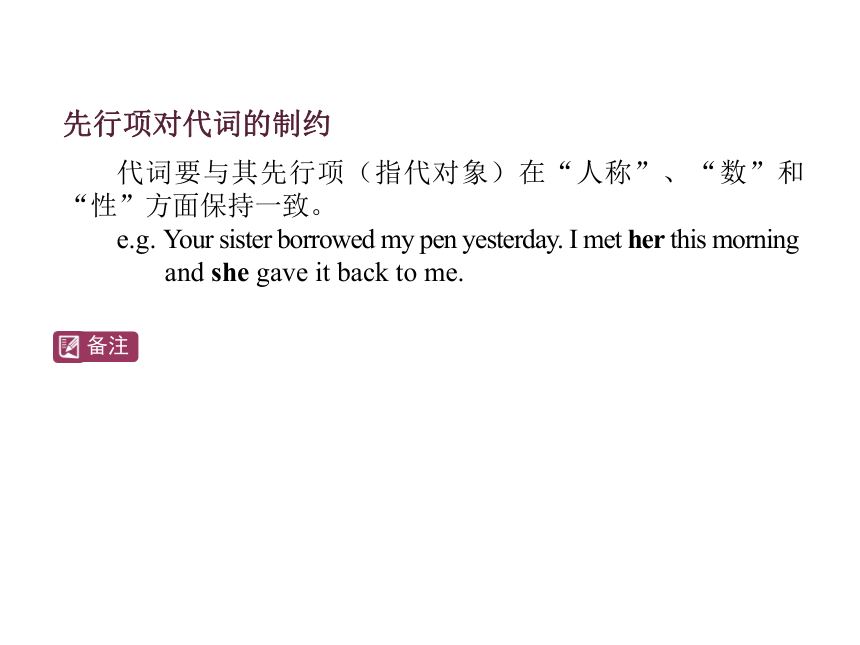 | |
| 格式 | pptx | ||
| 文件大小 | 843.3KB | ||
| 资源类型 | 教案 | ||
| 版本资源 | 新概念英语 | ||
| 科目 | 英语 | ||
| 更新时间 | 2024-11-25 09:25:37 | ||
图片预览

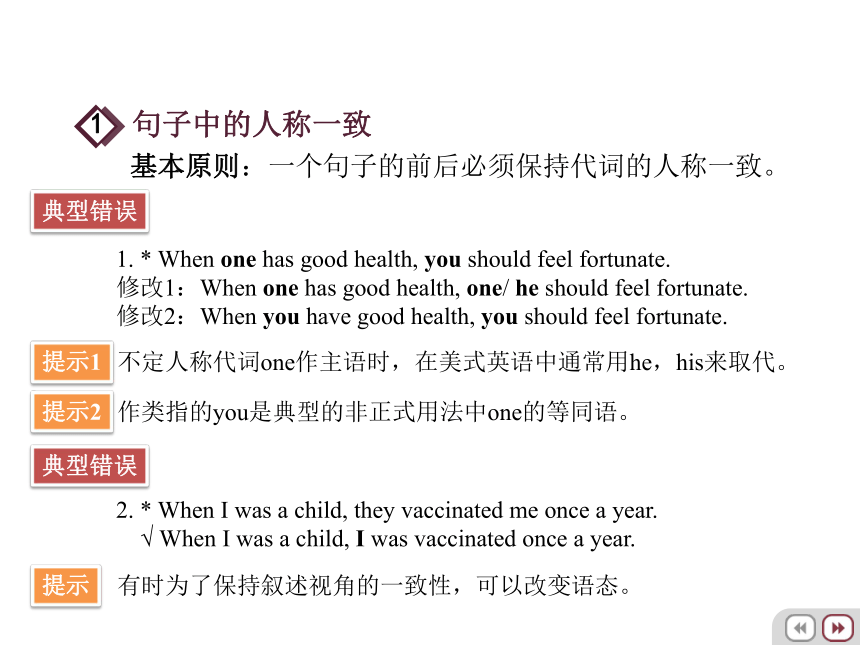
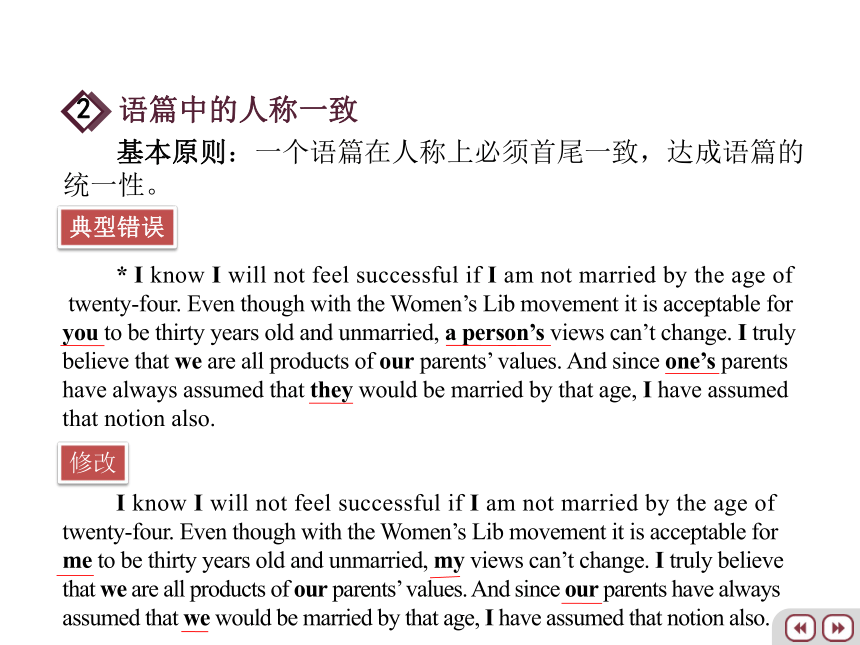
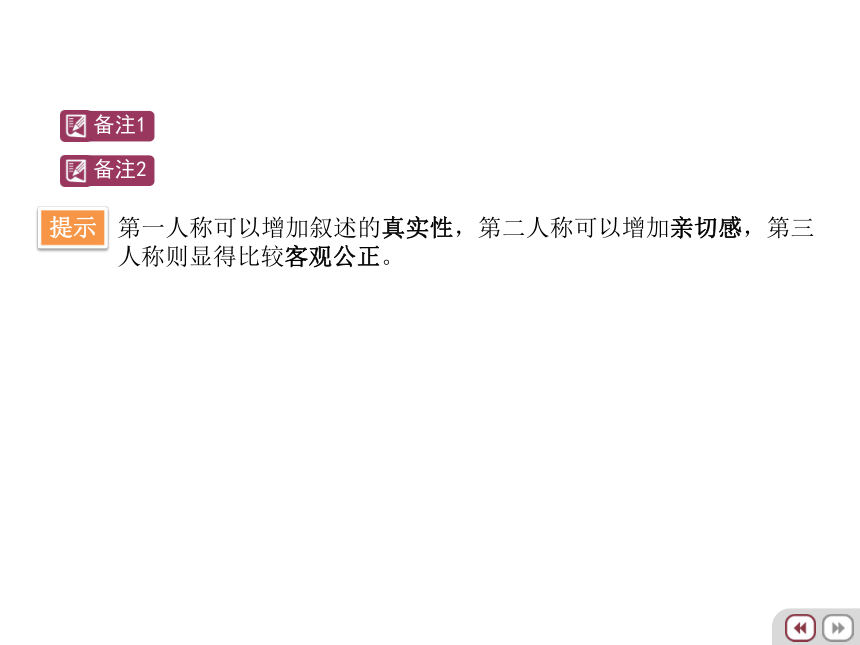
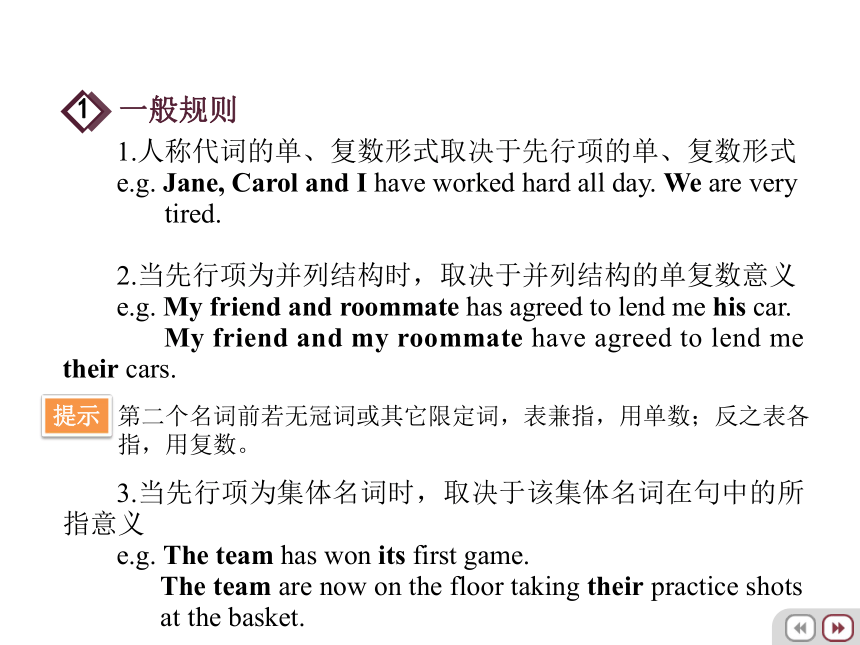
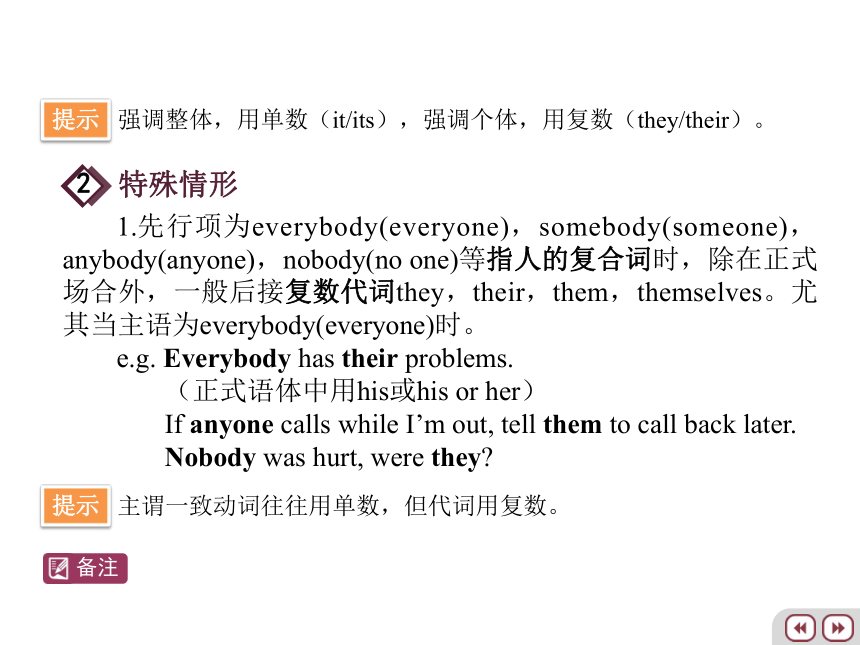
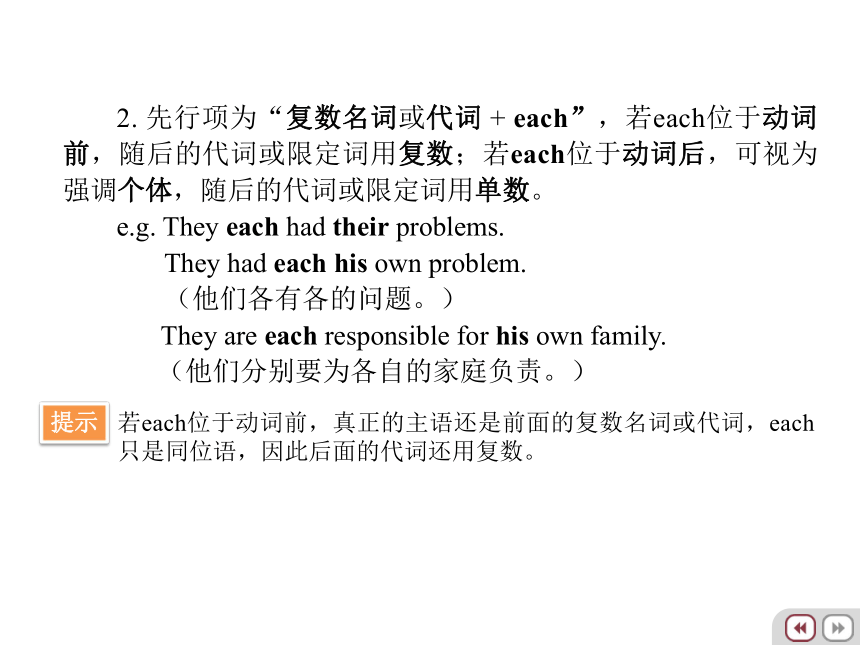
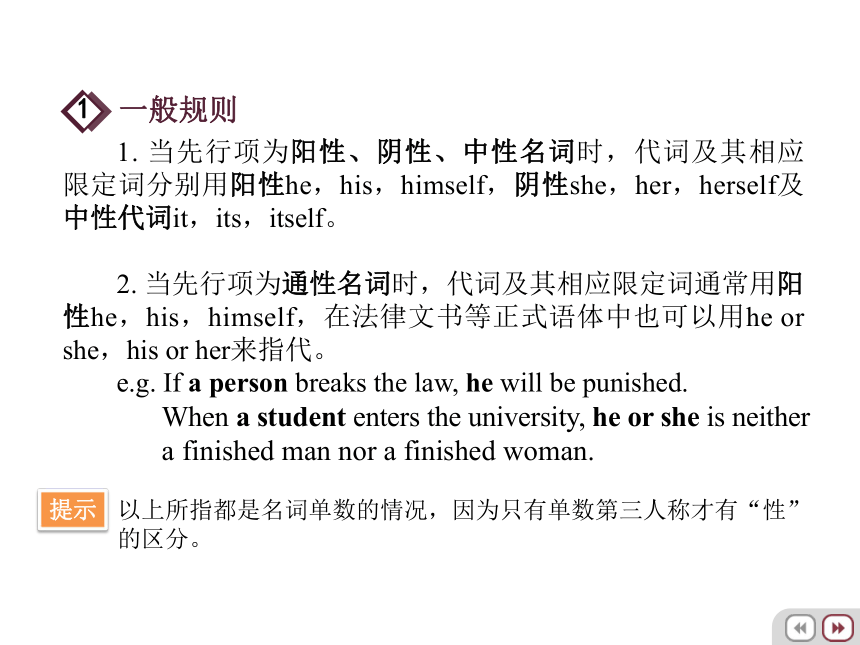
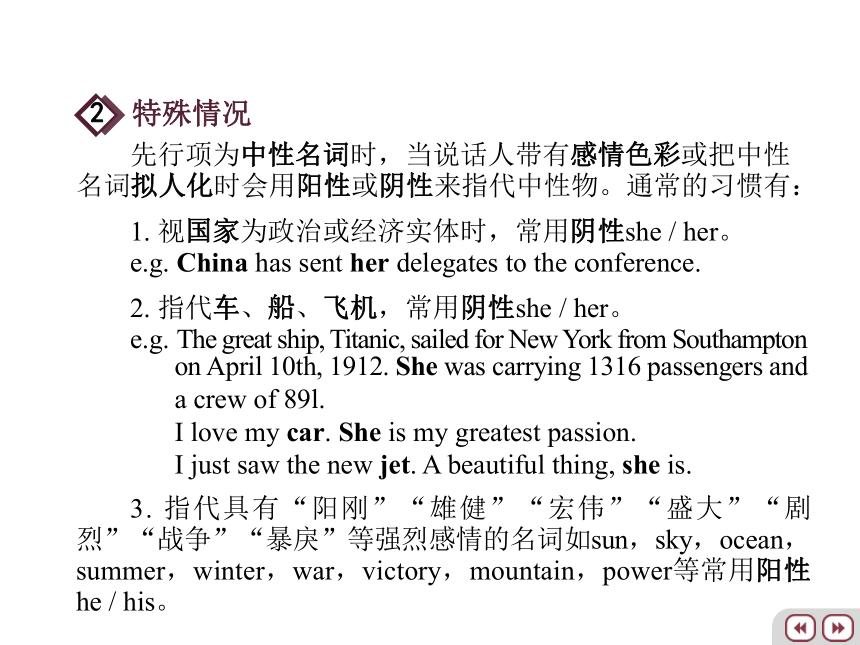


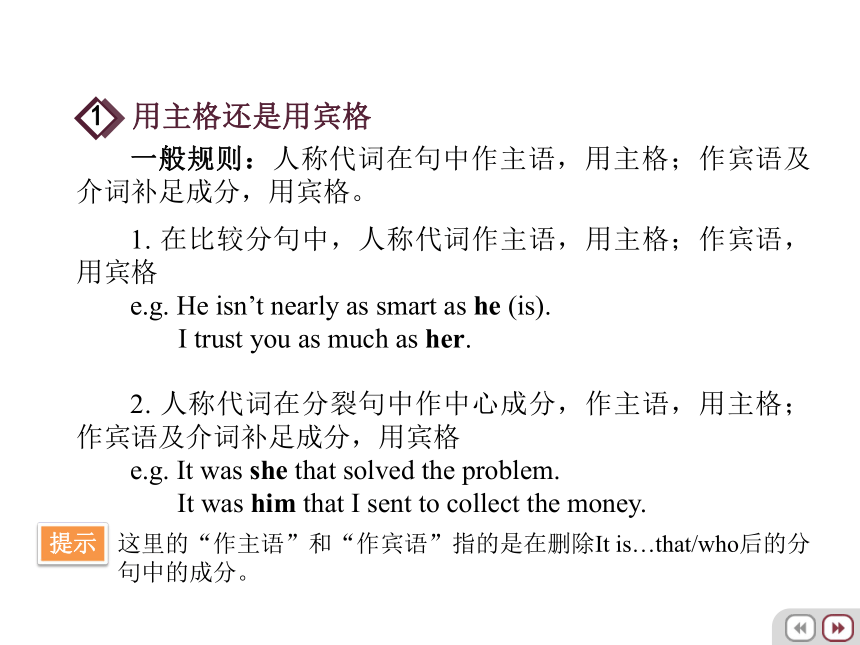
文档简介
(共33张PPT)
备注
先行项对代词的制约
代词要与其先行项(指代对象)在“人称”、“数”和“性”方面保持一致。
e.g. Your sister borrowed my pen yesterday. I met her this morning
and she gave it back to me.
基本原则:一个句子的前后必须保持代词的人称一致。
句子中的人称一致
1
典型错误
1. * When one has good health, you should feel fortunate.
修改1:When one has good health, one/ he should feel fortunate.
修改2:When you have good health, you should feel fortunate.
不定人称代词one作主语时,在美式英语中通常用he,his来取代。
作类指的you是典型的非正式用法中one的等同语。
提示1
提示2
2. * When I was a child, they vaccinated me once a year.
√ When I was a child, I was vaccinated once a year.
有时为了保持叙述视角的一致性,可以改变语态。
提示
典型错误
基本原则:一个语篇在人称上必须首尾一致,达成语篇的统一性。
语篇中的人称一致
2
典型错误
* I know I will not feel successful if I am not married by the age of
twenty-four. Even though with the Women’s Lib movement it is acceptable for
you to be thirty years old and unmarried, a person’s views can’t change. I truly
believe that we are all products of our parents’ values. And since one’s parents
have always assumed that they would be married by that age, I have assumed
that notion also.
修改
I know I will not feel successful if I am not married by the age of
twenty-four. Even though with the Women’s Lib movement it is acceptable for
me to be thirty years old and unmarried, my views can’t change. I truly believe
that we are all products of our parents’ values. And since our parents have always
assumed that we would be married by that age, I have assumed that notion also.
备注1
备注2
第一人称可以增加叙述的真实性,第二人称可以增加亲切感,第三人称则显得比较客观公正。
提示
1.人称代词的单、复数形式取决于先行项的单、复数形式
e.g. Jane, Carol and I have worked hard all day. We are very
tired.
2.当先行项为并列结构时,取决于并列结构的单复数意义
e.g. My friend and roommate has agreed to lend me his car.
My friend and my roommate have agreed to lend me their cars.
3.当先行项为集体名词时,取决于该集体名词在句中的所指意义
e.g. The team has won its first game.
The team are now on the floor taking their practice shots
at the basket.
一般规则
1
第二个名词前若无冠词或其它限定词,表兼指,用单数;反之表各指,用复数。
提示
特殊情形
2
1.先行项为everybody(everyone),somebody(someone),anybody(anyone),nobody(no one)等指人的复合词时,除在正式场合外,一般后接复数代词they,their,them,themselves。尤其当主语为everybody(everyone)时。
e.g. Everybody has their problems.
(正式语体中用his或his or her)
If anyone calls while I’m out, tell them to call back later.
Nobody was hurt, were they
强调整体,用单数(it/its),强调个体,用复数(they/their)。
主谓一致动词往往用单数,但代词用复数。
提示
提示
备注
2. 先行项为“复数名词或代词 + each”,若each位于动词前,随后的代词或限定词用复数;若each位于动词后,可视为强调个体,随后的代词或限定词用单数。
e.g. They each had their problems.
They had each his own problem.
(他们各有各的问题。)
They are each responsible for his own family.
(他们分别要为各自的家庭负责。)
若each位于动词前,真正的主语还是前面的复数名词或代词,each只是同位语,因此后面的代词还用复数。
提示
1. 当先行项为阳性、阴性、中性名词时,代词及其相应限定词分别用阳性he,his,himself,阴性she,her,herself及中性代词it,its,itself。
2. 当先行项为通性名词时,代词及其相应限定词通常用阳性he,his,himself,在法律文书等正式语体中也可以用he or she,his or her来指代。
e.g. If a person breaks the law, he will be punished.
一般规则
1
以上所指都是名词单数的情况,因为只有单数第三人称才有“性”的区分。
提示
When a student enters the university, he or she is neither
a finished man nor a finished woman.
先行项为中性名词时,当说话人带有感彩或把中性名词拟人化时会用阳性或阴性来指代中性物。通常的习惯有:
1. 视国家为政治或经济实体时,常用阴性she / her。
e.g. China has sent her delegates to the conference.
2. 指代车、船、飞机,常用阴性she / her。
e.g. The great ship, Titanic, sailed for New York from Southampton
3. 指代具有“阳刚”“雄健”“宏伟”“盛大”“剧烈”“战争”“暴戾”等强烈感情的名词如sun,sky,ocean,summer,winter,war,victory,mountain,power等常用阳性he / his。
特殊情况
2
on April 10th, 1912. She was carrying 1316 passengers and
a crew of 89l.
I love my car. She is my greatest passion.
I just saw the new jet. A beautiful thing, she is.
e.g. The sun was shining in all his splendid beauty.
4.具有“阴柔”“和煦”“美丽”“善良”“谦虚”“公正”“友爱”等感彩的名词如moon,love,peace,earth,truth,spring,justice,history,modesty,liberty等常用阴性she / her。
e.g. The moon pales the stars with her brilliance.
History has revised her verdict.
代词的“性”的选择往往和相应的拉丁词的性别相一致,如在拉丁文中sun,war常作阳性,moon,history常作阴性。
提示
War can no longer delude (哄骗) us; he leads the way through
the cornfields to the cemetery.
5. 一些可用于雌雄两性的动物名称如bird,fish,duck,dog,fox,wolf,horse等,可用阳性he / his。
e.g. We could catch any bird by putting salt on his tail.
The wolf in sheep’s clothing hid himself among a flock of sheep.
也有部分雌雄两性的动物名称如cat,deer,hare等通常用阴性she / her。
提示
一般规则:人称代词在句中作主语,用主格;作宾语及介词补足成分,用宾格。
1. 在比较分句中,人称代词作主语,用主格;作宾语,用宾格
e.g. He isn’t nearly as smart as he (is).
I trust you as much as her.
2. 人称代词在分裂句中作中心成分,作主语,用主格;作宾语及介词补足成分,用宾格
e.g. It was she that solved the problem.
It was him that I sent to collect the money.
用主格还是用宾格
1
这里的“作主语”和“作宾语”指的是在删除It is…that/who后的分句中的成分。
提示
3. 由人称疑问代词who引导的问句或名词性分句中,以及whoever引导的名词性分句中,该代词作主语,用主格;作宾语及介词补足成分,用宾格
e.g. I don’t know who can solve our problems.
I don’t know whom they finally selected.
They always elect whoever is popular.
I will not trust whomever they will elect.
My sympathy is with this poor man, whomever he might be thought to be.
在名词性分句中代词的格的选择取决于其在名词性分句中的句法功能。
whoever在不定式之后作补语,一般用宾格,类似于作宾语。
提示1
提示2
4. 在由关系代词who引导的分句中,who之后跟有I believe,I think等插入语,who作主语,用主格
e.g. He is a man who I think means what he says.
She is a woman who people believe may be the president of
the company some day.
非正式语体中/实际使用中的特殊情况:
1. 当人称代词用于不带谓语或者不带限定谓语动词的不完全句中作主语时,用宾格
e.g. — Does any of you know where Tom lives
—Me.
2. 人称代词在比较分句中作主语,可以用宾格
e.g. She is much taller than me.
He is clever than us all.
关键是辨识I believe,people believe,I think,they say等插入语。
提示
3. 在分裂句中作中心成分,作主语,可以用宾格
e.g. It was me that did it.
4. 当句子含有“everybody / nobody + but / except + 人称代词”结构时,在主语的位置上,常用主格,但“but / except + 人称代词”出现在句尾时,用宾格;该结构在宾语位置上,用宾格
e.g. Nobody but she can solve our problems.
Nobody can solve our problems but her.
I interviewed everybody but him.
5. who引导的问句或名词性分句中,在非正式语体中,只要在主语的位置上,就用主格
e.g. Who did you want to nominate
I don’t know who you want to nominate
特别是当这类人称代词带有all,both作同位语时。
提示
用宾格还是用属格
2
问题产生:主要是-ing分词分句既在主句中作宾语或介词补足成分,又带有自己的逻辑主语,所以产生用宾格还是用属格的问题。
1.带有人称代词作主语的-ing分词分句在主句中作宾语或介词补足成分,有属格(正式语体)和宾格(非正式语体)的选择。
e.g. I don’t mind their / them changing their minds. (正式语体 / 非正式语体)
I am surprised at his / him making that mistake. (用属格居多)
例外:当主句带有deny(否认),defer(延误),postpone(推迟)等作谓语动词,其后的-ing分词分句如还带有逻辑主语,通常只用属格,不论语体。
e.g. He doesn’t deny his breaking the agreement.
My failure to complete the task deferred my going on holiday.
2. 如果人称代词在SVOC句型中作宾语,又跟有-ing分词分句作补语,人称代词只能用宾格。
比较:[1] They caught him cheating on the exam.
S V O C
[2] His conscience inhibited his cheating the poor out of their money.
S V O
句[1]中“抓”的是“他”,而非“他考场作弊的行为”;句[2]中“阻止”的是“他骗取穷人钱的行为”。
提示
When one has good health, ______ should feel fortunate.
A.
B.
C.
D.
you
she
he
we
该题考查人称代词的类指用法。人称带词one,we,you,they都可表类指,但在同一句及上下句中,代词与它的先行项必须在人称上保持一致,不能无端地在中途改变。题干从句中用one类指一般的人们,语气正式,为了避免重复,主句中可用he来取代,因此C为正确答案。
当一个人拥有健康时,他应该感到幸运。
Which of the following sentences is INCORRECT
A.
B.
C.
D.
They each have two tickets.
They cost twenty yuan each.
Each they have bought the same book.
They were given two magazines each.
该题考查不定代词each的用法。不定代词each在句中可以作主语、宾语、和同位语,用作同位语时,each可以用在代词之后,不能用在代词之前,C项可以改为Each of them … 或者They have each bought …,因此选C。B、D项为each用作副词,修饰谓语。
下面哪句话不对
Our association, which has consistently pressed for greater employment opportunities for the disabled, will publish ______ proposals in the near future.
A.
B.
C.
D.
their
our
his
its
该题考查句中的人称一致。该句的主语our association为中性名词,在句中看作一个整体,作单数,且是指物的第三人称,名词proposals前需要用中性物主限定词its,而不用指人的物主限定词。因此D为正确答案。
我们的协会,一直迫切要求为残疾人提供更多的就业机会,在不久的将来会发布一系列提案。
I know he failed his last test, but really he’s ______ stupid.
A.
B.
C.
D.
something but
anything but
nothing but
not but
该题考查不定代词搭配anything but与nothing but的辨析。anything but意为“绝不;根本不”,由句中转折连词but可知,anything but符合句意,因此B为正确答案。nothing but意为“只有;只不过”。A、D项搭配均不正确。
我知道他上次考试没有通过,但他真的不笨。
We can assign the task to ______ is capable and trustworthy.
A.
B.
C.
D.
whomever
who
whom
whoever
该题考查whoever引导的名词性从句中关系代词格的选择问题。本句需要一个关系代词引导的名词性分句作介词to的补足成分,这时关系代词的格依其在分句中的地位而定,在分句中作主语,用主格。whomever和whom只能作宾语,不合要求;who和whoever都可以作主语,人称疑问代词who含特指含义,而whoever相当于“any person who”,即“…的任何人”,含泛指含义,符合句意,因此选项D为正确答案。
我们可以把这项工作任何交给有能力并且值得信赖的人。
本讲主要介绍了代词与其先行项在“人称”、“数”、“性”方面的一致关系,人称代词的主格和宾格、宾格和属格的选择问题,以及人称代词的类指用法。
代词与其先行项要在“人称”、“数”、“性”方面保持一致的一般规则较容易掌握,重点关注特殊情形。在“人称”的一致性上,不但要在句子层面保持人称指代的一致性,还要特别注意在语篇层面上要保持说话或写作视角的全文一贯性。在“数”的一致性上,当先行项为everybody,anybody等复合词时在非正式语体中代词常用复数;当先行项为并列结构及集体名词时代词的选择需遵循意义一致的原则。在“性”的一致性上,先行项为中性名词时,当说话人带有感彩或把中性名词拟人化时会用阳性或阴性来指代。
人称代词格的选择主要取决于其在句中的句法功能,作主语用主格,作宾语用宾格,表“主谓”等属格意义用属格,
同时与语体及习惯用法有关,学习中也要注意它们在非正式语体中的实际使用情况。四个人称代词one,we,you,they都可用作类指,one,we常见于正式语体,you,they常见于非正式语体,注意它们在句中不能混杂使用,以免造成指代不清,语体混乱不协调。
When it comes to making a conscious effort to help keep a public place clean, most people just don’t make the effort. I’m a maintenance man for a department store. ①If you did make the effort to help keep the public place where I work clean, we probably wouldn’t have a job.
When it comes to making a conscious effort to help keep a public place clean, most people just don’t make the effort. I’m a maintenance man for a department store. If people did make the effort, I probably wouldn’t have a job.
①If people did make the effort, I probably wouldn’t have a job.
原文在第一段开篇提出“多数人并不那么自觉地保持公共场所卫生”这一论点之后,作者以第一人称单数“I”——保洁员的视角开始叙述,但是句①在从反面论述时,又以第二人称“you”作为假设对象,而以第一人称复数“we”作出推论,这显然违反了语篇中人称一致的原则。因此,这里的“you”应改为people,“we”应改为“I”,分别照应上文的most people和I。此外,句①条件分句中的不定式结构to help keep the public place where I work clean与第一句中的不定式结构有所重复,出于修辞上的考虑可以将其删除。
②The area that you have to spend the most time cleaning is the employees’ lunchroom. They go there during breaks, lunch, and dinner. ③The maintenance department supplies the waste containers for garbage and the ashtrays for cigarette butts.④When they finish their food, they will generally either throw their papers on the floor or leave it on the table.
The area that I have to spend the most time cleaning is the employees’ lunchroom. They go there during breaks, lunch, and dinner. The maintenance department supplies containers for garbage and ashtrays for cigarette butts. But when they finish their food, the employees will either throw their papers on the floor or leave them on the table.
③The maintenance department supplies containers for garbage and ashtrays for cigarette butts.
句③containers for garbage和ashtrays for cigarette butts需用复数名词与零冠词搭配表类指,不用定冠词表特指;另外,containers for garbage与waste containers表达相同意思(垃圾箱),可删除waste,以避免语义重复。该句意为“维护部门提供垃圾箱和装烟头用的烟灰缸”。
④But when they finish their food, the employees will either throw their papers on the floor or leave them on the table.
句④首先在语义上发生了明显的转折,应该在句首添加表转折的并列连词but;其次,it在“leave it on the table”中的使用容易误认为回指从句中的“food”,所以应改为“them”,指代同句中的their papers;最后,主句中的they最好改为the employees,以使上下文的they,their指代清晰。
②The area that I have to spend the most time cleaning is the employees’ lunchroom.
同样,第二段本应继续保持“I”的叙述视角不变,讲述作者(“I”)眼中的员工们(“they”)在餐厅就餐时的表现,但第二段开头叙述视角却又转换为第二人称“you”展开,这与第一段的叙述视角不一致,所以应将句②中关系分句的主语“you”改为“I”。
⑤One will on occasion throw their papers in the garbage. An employee who smokes will either flick their ashes on the floor or on their table. Everybody’s butts I usually find on the floor and in half-filled soda cups.⑥The cigarettes may be found anywhere other than in the ashtray, because you steal the ashtrays or you fill it with gum. Sometimes an employee will remark, “Aren’t these people pigs They don’t even clean up after themselves,” as they proceed to walk away from their littered table.
Some employees will on occasion throw their papers in the garbage containers, but most of them who smoke will either flick their ashes on the floor or in the half-filled soda cups. Cigarette butts are usually found anywhere other than in the ashtrays, because the ashtrays may have been stolen or have been filled with gum. Sometimes an employee will remark, “Aren’t these people pigs They don’t even clean up after themselves,” as they proceed to walk away from their littered table.
⑥Cigarette butts are usually found anywhere other than in the ashtrays, because the ashtrays may have been stolen or have been filled with gum.
原第8句的主句的主语the cigarettes(香烟)用词不准,应改为cigarette butts(烟头),零冠词表类指;主句中ashtray的指代不清,应指员工们桌上各自的烟灰缸,应该用复数形式,才能与从句中的ashtrays保持一致;because从句的主语不应该转换人称,应该与上文的ashtrays保持一致,此外,fill it with gum中的代词it应改为them。注意:实现指代清晰、上下文更连贯的简便方法之一就是将主动态变为以the ashtrays作主语的被动态。
⑤Some employees will on occasion throw their papers in the garbage containers, but most of them who smoke will either flick their ashes on the floor or in the half-filled soda cups.
本段原第5、第6、第7句指代不清,上下文的逻辑关系不明,结构松散,可以根据逻辑语义关系将这三个句子合并处理为表转折关系的并列句。原第5句的前一分句的主语应将表类指的one改为具体所指“some employees”,才能与后面的物主限定词their相一致,另外,为了表达更加准确,in the garbage宜改为in the garbage containers;原第6句以不定冠词“An employee who smokes”表类指,与上文的视角以及后面的限定词their不一致,应根据语境改为具体所指most of them who smoke,两个小句之间是转折关系,可用but连接;原第7句为宾语前置句,描写作者看到“烟头扔在地板上及半满的汽水杯里”的情况,为了避免重复及行文衔接紧密,可作简化处理,处理为介词词组作上一句中关系分句的一个状语。
Somebody left (his, their) raincoat on this rack; (he, they) will have to come and get it.
The committee will insist on (its, their) rights.
The committee wishes to reconsider (its, their) decision.
Everyone thinks (he is, they are) the centre of the universe.
Something strange happened, didn’t (it, they)
Every passenger has to carry (his, their) own luggage.
1.0
2.0
3.0
4.
5.
6.
Wells is one of the editors who always (takes, take) a leading role in (his, their) community.
Neither of the women (has, have) brought (her, their) certificate.
No manager should do for his staff what (he, they) could do for (himself, themselves).
Dictatorship (独裁) is the one of many evils which (tends, tend) to perpetuate (itself, themselves).
7.0
8.0
9.
10.
1.
2.
3.
4.
5.
After ________ weighed anchor, the ship slipped out of the harbor.
Getting out of the car, he said to the man in overalls: “Fill ________ up, please.”
One must not lose ________ temper when ________ is being criticized for ________ conduct.
Once upon a time there was a wolf in sheep’s clothing, hiding ________ among a flock of sheep.
The moon glittered as ________ rolled through the deep vault of a cloudless sky.
it / she
it / her
his / one’s
himself
she
his / one’s
he / one
6.
7.
8.
9.
10.
France has made it plain that ________ will reject the project.
A politician may try to be completely honest, but ___________ always finds ___________ has to compromise.
When bathing a baby, always hold ________ securely.
At first the earth was large and shone in the heavens filling a great part of them, but every moment ________ grew smaller and more distant.
If a student needs advice about careers, _____________ should consult the career officers.
it / she
he / he or she
it / him
it / she
he / he or she
he / he or she
Just between you and (I, me), that man is crazy.
It was (she, her) who finally spoke up.
No one will be responsible for it, neither you nor (she, her).
To (who, whom) should I address this letter
He promised to support (whoever, whomever) of the Republican prospects (共和党候选人) was chosen.
I found (his, him) lying by the roadside.
1.0
2.0
3.0
4.
5.
6.
I wouldn’t trust (anyone’s else, anyone else’s) judgement.
I cannot understand (him, his) refusing to do that for me.
I don’t mind (him, his) criticizing me so severely.
The woman (who, whom) we thought to be (she, her) turned out to be her sister.
7.0
8.0
9.
10.
备注
先行项对代词的制约
代词要与其先行项(指代对象)在“人称”、“数”和“性”方面保持一致。
e.g. Your sister borrowed my pen yesterday. I met her this morning
and she gave it back to me.
基本原则:一个句子的前后必须保持代词的人称一致。
句子中的人称一致
1
典型错误
1. * When one has good health, you should feel fortunate.
修改1:When one has good health, one/ he should feel fortunate.
修改2:When you have good health, you should feel fortunate.
不定人称代词one作主语时,在美式英语中通常用he,his来取代。
作类指的you是典型的非正式用法中one的等同语。
提示1
提示2
2. * When I was a child, they vaccinated me once a year.
√ When I was a child, I was vaccinated once a year.
有时为了保持叙述视角的一致性,可以改变语态。
提示
典型错误
基本原则:一个语篇在人称上必须首尾一致,达成语篇的统一性。
语篇中的人称一致
2
典型错误
* I know I will not feel successful if I am not married by the age of
twenty-four. Even though with the Women’s Lib movement it is acceptable for
you to be thirty years old and unmarried, a person’s views can’t change. I truly
believe that we are all products of our parents’ values. And since one’s parents
have always assumed that they would be married by that age, I have assumed
that notion also.
修改
I know I will not feel successful if I am not married by the age of
twenty-four. Even though with the Women’s Lib movement it is acceptable for
me to be thirty years old and unmarried, my views can’t change. I truly believe
that we are all products of our parents’ values. And since our parents have always
assumed that we would be married by that age, I have assumed that notion also.
备注1
备注2
第一人称可以增加叙述的真实性,第二人称可以增加亲切感,第三人称则显得比较客观公正。
提示
1.人称代词的单、复数形式取决于先行项的单、复数形式
e.g. Jane, Carol and I have worked hard all day. We are very
tired.
2.当先行项为并列结构时,取决于并列结构的单复数意义
e.g. My friend and roommate has agreed to lend me his car.
My friend and my roommate have agreed to lend me their cars.
3.当先行项为集体名词时,取决于该集体名词在句中的所指意义
e.g. The team has won its first game.
The team are now on the floor taking their practice shots
at the basket.
一般规则
1
第二个名词前若无冠词或其它限定词,表兼指,用单数;反之表各指,用复数。
提示
特殊情形
2
1.先行项为everybody(everyone),somebody(someone),anybody(anyone),nobody(no one)等指人的复合词时,除在正式场合外,一般后接复数代词they,their,them,themselves。尤其当主语为everybody(everyone)时。
e.g. Everybody has their problems.
(正式语体中用his或his or her)
If anyone calls while I’m out, tell them to call back later.
Nobody was hurt, were they
强调整体,用单数(it/its),强调个体,用复数(they/their)。
主谓一致动词往往用单数,但代词用复数。
提示
提示
备注
2. 先行项为“复数名词或代词 + each”,若each位于动词前,随后的代词或限定词用复数;若each位于动词后,可视为强调个体,随后的代词或限定词用单数。
e.g. They each had their problems.
They had each his own problem.
(他们各有各的问题。)
They are each responsible for his own family.
(他们分别要为各自的家庭负责。)
若each位于动词前,真正的主语还是前面的复数名词或代词,each只是同位语,因此后面的代词还用复数。
提示
1. 当先行项为阳性、阴性、中性名词时,代词及其相应限定词分别用阳性he,his,himself,阴性she,her,herself及中性代词it,its,itself。
2. 当先行项为通性名词时,代词及其相应限定词通常用阳性he,his,himself,在法律文书等正式语体中也可以用he or she,his or her来指代。
e.g. If a person breaks the law, he will be punished.
一般规则
1
以上所指都是名词单数的情况,因为只有单数第三人称才有“性”的区分。
提示
When a student enters the university, he or she is neither
a finished man nor a finished woman.
先行项为中性名词时,当说话人带有感彩或把中性名词拟人化时会用阳性或阴性来指代中性物。通常的习惯有:
1. 视国家为政治或经济实体时,常用阴性she / her。
e.g. China has sent her delegates to the conference.
2. 指代车、船、飞机,常用阴性she / her。
e.g. The great ship, Titanic, sailed for New York from Southampton
3. 指代具有“阳刚”“雄健”“宏伟”“盛大”“剧烈”“战争”“暴戾”等强烈感情的名词如sun,sky,ocean,summer,winter,war,victory,mountain,power等常用阳性he / his。
特殊情况
2
on April 10th, 1912. She was carrying 1316 passengers and
a crew of 89l.
I love my car. She is my greatest passion.
I just saw the new jet. A beautiful thing, she is.
e.g. The sun was shining in all his splendid beauty.
4.具有“阴柔”“和煦”“美丽”“善良”“谦虚”“公正”“友爱”等感彩的名词如moon,love,peace,earth,truth,spring,justice,history,modesty,liberty等常用阴性she / her。
e.g. The moon pales the stars with her brilliance.
History has revised her verdict.
代词的“性”的选择往往和相应的拉丁词的性别相一致,如在拉丁文中sun,war常作阳性,moon,history常作阴性。
提示
War can no longer delude (哄骗) us; he leads the way through
the cornfields to the cemetery.
5. 一些可用于雌雄两性的动物名称如bird,fish,duck,dog,fox,wolf,horse等,可用阳性he / his。
e.g. We could catch any bird by putting salt on his tail.
The wolf in sheep’s clothing hid himself among a flock of sheep.
也有部分雌雄两性的动物名称如cat,deer,hare等通常用阴性she / her。
提示
一般规则:人称代词在句中作主语,用主格;作宾语及介词补足成分,用宾格。
1. 在比较分句中,人称代词作主语,用主格;作宾语,用宾格
e.g. He isn’t nearly as smart as he (is).
I trust you as much as her.
2. 人称代词在分裂句中作中心成分,作主语,用主格;作宾语及介词补足成分,用宾格
e.g. It was she that solved the problem.
It was him that I sent to collect the money.
用主格还是用宾格
1
这里的“作主语”和“作宾语”指的是在删除It is…that/who后的分句中的成分。
提示
3. 由人称疑问代词who引导的问句或名词性分句中,以及whoever引导的名词性分句中,该代词作主语,用主格;作宾语及介词补足成分,用宾格
e.g. I don’t know who can solve our problems.
I don’t know whom they finally selected.
They always elect whoever is popular.
I will not trust whomever they will elect.
My sympathy is with this poor man, whomever he might be thought to be.
在名词性分句中代词的格的选择取决于其在名词性分句中的句法功能。
whoever在不定式之后作补语,一般用宾格,类似于作宾语。
提示1
提示2
4. 在由关系代词who引导的分句中,who之后跟有I believe,I think等插入语,who作主语,用主格
e.g. He is a man who I think means what he says.
She is a woman who people believe may be the president of
the company some day.
非正式语体中/实际使用中的特殊情况:
1. 当人称代词用于不带谓语或者不带限定谓语动词的不完全句中作主语时,用宾格
e.g. — Does any of you know where Tom lives
—Me.
2. 人称代词在比较分句中作主语,可以用宾格
e.g. She is much taller than me.
He is clever than us all.
关键是辨识I believe,people believe,I think,they say等插入语。
提示
3. 在分裂句中作中心成分,作主语,可以用宾格
e.g. It was me that did it.
4. 当句子含有“everybody / nobody + but / except + 人称代词”结构时,在主语的位置上,常用主格,但“but / except + 人称代词”出现在句尾时,用宾格;该结构在宾语位置上,用宾格
e.g. Nobody but she can solve our problems.
Nobody can solve our problems but her.
I interviewed everybody but him.
5. who引导的问句或名词性分句中,在非正式语体中,只要在主语的位置上,就用主格
e.g. Who did you want to nominate
I don’t know who you want to nominate
特别是当这类人称代词带有all,both作同位语时。
提示
用宾格还是用属格
2
问题产生:主要是-ing分词分句既在主句中作宾语或介词补足成分,又带有自己的逻辑主语,所以产生用宾格还是用属格的问题。
1.带有人称代词作主语的-ing分词分句在主句中作宾语或介词补足成分,有属格(正式语体)和宾格(非正式语体)的选择。
e.g. I don’t mind their / them changing their minds. (正式语体 / 非正式语体)
I am surprised at his / him making that mistake. (用属格居多)
例外:当主句带有deny(否认),defer(延误),postpone(推迟)等作谓语动词,其后的-ing分词分句如还带有逻辑主语,通常只用属格,不论语体。
e.g. He doesn’t deny his breaking the agreement.
My failure to complete the task deferred my going on holiday.
2. 如果人称代词在SVOC句型中作宾语,又跟有-ing分词分句作补语,人称代词只能用宾格。
比较:[1] They caught him cheating on the exam.
S V O C
[2] His conscience inhibited his cheating the poor out of their money.
S V O
句[1]中“抓”的是“他”,而非“他考场作弊的行为”;句[2]中“阻止”的是“他骗取穷人钱的行为”。
提示
When one has good health, ______ should feel fortunate.
A.
B.
C.
D.
you
she
he
we
该题考查人称代词的类指用法。人称带词one,we,you,they都可表类指,但在同一句及上下句中,代词与它的先行项必须在人称上保持一致,不能无端地在中途改变。题干从句中用one类指一般的人们,语气正式,为了避免重复,主句中可用he来取代,因此C为正确答案。
当一个人拥有健康时,他应该感到幸运。
Which of the following sentences is INCORRECT
A.
B.
C.
D.
They each have two tickets.
They cost twenty yuan each.
Each they have bought the same book.
They were given two magazines each.
该题考查不定代词each的用法。不定代词each在句中可以作主语、宾语、和同位语,用作同位语时,each可以用在代词之后,不能用在代词之前,C项可以改为Each of them … 或者They have each bought …,因此选C。B、D项为each用作副词,修饰谓语。
下面哪句话不对
Our association, which has consistently pressed for greater employment opportunities for the disabled, will publish ______ proposals in the near future.
A.
B.
C.
D.
their
our
his
its
该题考查句中的人称一致。该句的主语our association为中性名词,在句中看作一个整体,作单数,且是指物的第三人称,名词proposals前需要用中性物主限定词its,而不用指人的物主限定词。因此D为正确答案。
我们的协会,一直迫切要求为残疾人提供更多的就业机会,在不久的将来会发布一系列提案。
I know he failed his last test, but really he’s ______ stupid.
A.
B.
C.
D.
something but
anything but
nothing but
not but
该题考查不定代词搭配anything but与nothing but的辨析。anything but意为“绝不;根本不”,由句中转折连词but可知,anything but符合句意,因此B为正确答案。nothing but意为“只有;只不过”。A、D项搭配均不正确。
我知道他上次考试没有通过,但他真的不笨。
We can assign the task to ______ is capable and trustworthy.
A.
B.
C.
D.
whomever
who
whom
whoever
该题考查whoever引导的名词性从句中关系代词格的选择问题。本句需要一个关系代词引导的名词性分句作介词to的补足成分,这时关系代词的格依其在分句中的地位而定,在分句中作主语,用主格。whomever和whom只能作宾语,不合要求;who和whoever都可以作主语,人称疑问代词who含特指含义,而whoever相当于“any person who”,即“…的任何人”,含泛指含义,符合句意,因此选项D为正确答案。
我们可以把这项工作任何交给有能力并且值得信赖的人。
本讲主要介绍了代词与其先行项在“人称”、“数”、“性”方面的一致关系,人称代词的主格和宾格、宾格和属格的选择问题,以及人称代词的类指用法。
代词与其先行项要在“人称”、“数”、“性”方面保持一致的一般规则较容易掌握,重点关注特殊情形。在“人称”的一致性上,不但要在句子层面保持人称指代的一致性,还要特别注意在语篇层面上要保持说话或写作视角的全文一贯性。在“数”的一致性上,当先行项为everybody,anybody等复合词时在非正式语体中代词常用复数;当先行项为并列结构及集体名词时代词的选择需遵循意义一致的原则。在“性”的一致性上,先行项为中性名词时,当说话人带有感彩或把中性名词拟人化时会用阳性或阴性来指代。
人称代词格的选择主要取决于其在句中的句法功能,作主语用主格,作宾语用宾格,表“主谓”等属格意义用属格,
同时与语体及习惯用法有关,学习中也要注意它们在非正式语体中的实际使用情况。四个人称代词one,we,you,they都可用作类指,one,we常见于正式语体,you,they常见于非正式语体,注意它们在句中不能混杂使用,以免造成指代不清,语体混乱不协调。
When it comes to making a conscious effort to help keep a public place clean, most people just don’t make the effort. I’m a maintenance man for a department store. ①If you did make the effort to help keep the public place where I work clean, we probably wouldn’t have a job.
When it comes to making a conscious effort to help keep a public place clean, most people just don’t make the effort. I’m a maintenance man for a department store. If people did make the effort, I probably wouldn’t have a job.
①If people did make the effort, I probably wouldn’t have a job.
原文在第一段开篇提出“多数人并不那么自觉地保持公共场所卫生”这一论点之后,作者以第一人称单数“I”——保洁员的视角开始叙述,但是句①在从反面论述时,又以第二人称“you”作为假设对象,而以第一人称复数“we”作出推论,这显然违反了语篇中人称一致的原则。因此,这里的“you”应改为people,“we”应改为“I”,分别照应上文的most people和I。此外,句①条件分句中的不定式结构to help keep the public place where I work clean与第一句中的不定式结构有所重复,出于修辞上的考虑可以将其删除。
②The area that you have to spend the most time cleaning is the employees’ lunchroom. They go there during breaks, lunch, and dinner. ③The maintenance department supplies the waste containers for garbage and the ashtrays for cigarette butts.④When they finish their food, they will generally either throw their papers on the floor or leave it on the table.
The area that I have to spend the most time cleaning is the employees’ lunchroom. They go there during breaks, lunch, and dinner. The maintenance department supplies containers for garbage and ashtrays for cigarette butts. But when they finish their food, the employees will either throw their papers on the floor or leave them on the table.
③The maintenance department supplies containers for garbage and ashtrays for cigarette butts.
句③containers for garbage和ashtrays for cigarette butts需用复数名词与零冠词搭配表类指,不用定冠词表特指;另外,containers for garbage与waste containers表达相同意思(垃圾箱),可删除waste,以避免语义重复。该句意为“维护部门提供垃圾箱和装烟头用的烟灰缸”。
④But when they finish their food, the employees will either throw their papers on the floor or leave them on the table.
句④首先在语义上发生了明显的转折,应该在句首添加表转折的并列连词but;其次,it在“leave it on the table”中的使用容易误认为回指从句中的“food”,所以应改为“them”,指代同句中的their papers;最后,主句中的they最好改为the employees,以使上下文的they,their指代清晰。
②The area that I have to spend the most time cleaning is the employees’ lunchroom.
同样,第二段本应继续保持“I”的叙述视角不变,讲述作者(“I”)眼中的员工们(“they”)在餐厅就餐时的表现,但第二段开头叙述视角却又转换为第二人称“you”展开,这与第一段的叙述视角不一致,所以应将句②中关系分句的主语“you”改为“I”。
⑤One will on occasion throw their papers in the garbage. An employee who smokes will either flick their ashes on the floor or on their table. Everybody’s butts I usually find on the floor and in half-filled soda cups.⑥The cigarettes may be found anywhere other than in the ashtray, because you steal the ashtrays or you fill it with gum. Sometimes an employee will remark, “Aren’t these people pigs They don’t even clean up after themselves,” as they proceed to walk away from their littered table.
Some employees will on occasion throw their papers in the garbage containers, but most of them who smoke will either flick their ashes on the floor or in the half-filled soda cups. Cigarette butts are usually found anywhere other than in the ashtrays, because the ashtrays may have been stolen or have been filled with gum. Sometimes an employee will remark, “Aren’t these people pigs They don’t even clean up after themselves,” as they proceed to walk away from their littered table.
⑥Cigarette butts are usually found anywhere other than in the ashtrays, because the ashtrays may have been stolen or have been filled with gum.
原第8句的主句的主语the cigarettes(香烟)用词不准,应改为cigarette butts(烟头),零冠词表类指;主句中ashtray的指代不清,应指员工们桌上各自的烟灰缸,应该用复数形式,才能与从句中的ashtrays保持一致;because从句的主语不应该转换人称,应该与上文的ashtrays保持一致,此外,fill it with gum中的代词it应改为them。注意:实现指代清晰、上下文更连贯的简便方法之一就是将主动态变为以the ashtrays作主语的被动态。
⑤Some employees will on occasion throw their papers in the garbage containers, but most of them who smoke will either flick their ashes on the floor or in the half-filled soda cups.
本段原第5、第6、第7句指代不清,上下文的逻辑关系不明,结构松散,可以根据逻辑语义关系将这三个句子合并处理为表转折关系的并列句。原第5句的前一分句的主语应将表类指的one改为具体所指“some employees”,才能与后面的物主限定词their相一致,另外,为了表达更加准确,in the garbage宜改为in the garbage containers;原第6句以不定冠词“An employee who smokes”表类指,与上文的视角以及后面的限定词their不一致,应根据语境改为具体所指most of them who smoke,两个小句之间是转折关系,可用but连接;原第7句为宾语前置句,描写作者看到“烟头扔在地板上及半满的汽水杯里”的情况,为了避免重复及行文衔接紧密,可作简化处理,处理为介词词组作上一句中关系分句的一个状语。
Somebody left (his, their) raincoat on this rack; (he, they) will have to come and get it.
The committee will insist on (its, their) rights.
The committee wishes to reconsider (its, their) decision.
Everyone thinks (he is, they are) the centre of the universe.
Something strange happened, didn’t (it, they)
Every passenger has to carry (his, their) own luggage.
1.0
2.0
3.0
4.
5.
6.
Wells is one of the editors who always (takes, take) a leading role in (his, their) community.
Neither of the women (has, have) brought (her, their) certificate.
No manager should do for his staff what (he, they) could do for (himself, themselves).
Dictatorship (独裁) is the one of many evils which (tends, tend) to perpetuate (itself, themselves).
7.0
8.0
9.
10.
1.
2.
3.
4.
5.
After ________ weighed anchor, the ship slipped out of the harbor.
Getting out of the car, he said to the man in overalls: “Fill ________ up, please.”
One must not lose ________ temper when ________ is being criticized for ________ conduct.
Once upon a time there was a wolf in sheep’s clothing, hiding ________ among a flock of sheep.
The moon glittered as ________ rolled through the deep vault of a cloudless sky.
it / she
it / her
his / one’s
himself
she
his / one’s
he / one
6.
7.
8.
9.
10.
France has made it plain that ________ will reject the project.
A politician may try to be completely honest, but ___________ always finds ___________ has to compromise.
When bathing a baby, always hold ________ securely.
At first the earth was large and shone in the heavens filling a great part of them, but every moment ________ grew smaller and more distant.
If a student needs advice about careers, _____________ should consult the career officers.
it / she
he / he or she
it / him
it / she
he / he or she
he / he or she
Just between you and (I, me), that man is crazy.
It was (she, her) who finally spoke up.
No one will be responsible for it, neither you nor (she, her).
To (who, whom) should I address this letter
He promised to support (whoever, whomever) of the Republican prospects (共和党候选人) was chosen.
I found (his, him) lying by the roadside.
1.0
2.0
3.0
4.
5.
6.
I wouldn’t trust (anyone’s else, anyone else’s) judgement.
I cannot understand (him, his) refusing to do that for me.
I don’t mind (him, his) criticizing me so severely.
The woman (who, whom) we thought to be (she, her) turned out to be her sister.
7.0
8.0
9.
10.
同课章节目录
